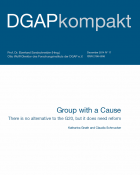In mid-November 2014, the G20 heads of state and government convened in Brisbane, Australia for their annual meeting. Even though the summits have lost much of their luster, there is still no alternative to this forum. As the global financial crisis showed all too clearly, there are enormous governance gaps in the international economic system that are still far from being closed – be it in financial regulation, redressing macroeconomic imbalances, or in questions of global tax competition. Because only the G20 enables a dialogue at eye level between highly industrialized states and the major emerging market economies, it remains the only plausible international forum for sounding out possible compromises on these subjects.
Beyond matters of long-term economic and financial policy, the G20 also offers an important platform for its member states to respond with speed and flexibility to current topics and crises. As we saw most recently in Brisbane, the heads of state and government use the opportunity furnished by the G20 summit for intensive bilateral meetings. In Australia, for example, Germany’s Chancellor Angela Merkel met with Russia’s President Vladimir Putin to discuss the situation in Ukraine in a talk that lasted more than three hours.
The G20 had an impressive launch, responding swiftly to the near collapse of the international financial system of 2008 and 2009. Since then, however, enthusiasm for the forum has clearly started to wane, as has the overall readiness of its members to cooperate with each other. Large differences in economic cycles, in overall economic conditions, and in political interests make it very hard indeed to reach compromise on an international level. On top of this, the implementation of international G20 agreements depends on the willingness of individual member states and their respective political circumstances. The agreements must also be ratified in part by national parliaments, which can hamper implementation. One example is the political system in the United States, with its current political deadlock. The forum’s future is therefore uncertain – despite its central importance for global economic governance. If it is to maintain its long-term effectiveness as a forum for dialogue and informal deal-making, the G20 must be strengthened.
Focus on International Topics
Billed as a great success of the Brisbane summit were the more than eight hundred measures undertaken by individual member states designed to increase global economic growth in the next five years by an additional 2.1 percent.[i] There is no doubt that the G20 can support changes in national policy such as structural reforms, investments in infrastructure, and national action plans to promote growth. What is ultimately needed, however, is political will for such change, and the reform efforts have to come from the member states themselves; the informal G20 does not have enough direct influence at the national policy level. Because of this, the G20 should stop placing themes like growth through investment and structural reform at the center of its agenda in the future and instead focus on topics that can only be solved at the international level and on which the forum can contribute direct added value.
Topics on which the G20 could reach decisive compromises in the future include, among others, better international tax cooperation; the removal of blockades in the multilateral trade negotiations of the Doha Round; reform of international financial institutions; and further financial regulation (for example in the area of shadow banking). Moreover, the high-level meetings should above all be used to give political impetus to greater international coordination and better standards. Implementation needs to take place in cooperation with such established international organizations as the International Monetary Fund (IMF), the World Bank, the Organization for Economic Cooperation and Development (OECD), the World Trade Organization (WTO), and the Basel-based Financial Stability Board (FSB).
A Better Anchor for the G20 “Troika”
The G20 is a member-driven forum, organized by a presidency that changes every year. Experience has shown that each new G20 presidency places its own items and priorities on the agenda and that these are often the result of national political processes and self-interest. This tends to overload the summit thematically – at the expense of coherence and continuity.
There are frequent calls for the G20 to establish a secretariat, but it would be difficult to align this with the G20’s informal character.[ii] The forum’s dialogue should continue to be driven forward by its members, as this ensures their ownership and commitment. One option for strengthening thematic continuity and providing better anchorage amid the rotating presidencies would be to further develop the “Presidential Troika” made up of the previous, the current, and the future G20 presidencies. Regular meetings and jointly established priorities could thus shape the agenda for three consecutive years. It also makes sense to pare down the G20 agenda to three long-term goals that could be overseen by the respective presidencies in comprehensive “work streams.” This would strengthen thematic continuity, keep the regular agenda from getting bogged down, and preserve the necessary freedom and summit time for world leaders to approach and react with flexibility to a range of current subjects and crises.
Turkey’s 2015 G20 Presidency: More Concentration and Continuity
The fact that systemically relevant states regularly meet at the highest political level provides an added value for governance of the global economy – even beyond the management of acute crises. It is therefore imperative to preserve this forum and to strengthen it. In November 2015, the tenth G20 summit of heads of state and government is to be held in Antalya under the presidency of Turkey. Turkey has set three priorities for its G20 presidency in 2015: Inclusiveness, Implementation, and Investment for Growth.[iii] Within the framework of its presidency, Turkey has taken over many topics from Australia, including trade, employment, infrastructural investment, and energy. The precise areas of focus are still unclear, however. The eleven subthemes currently on the agenda should be reduced as quickly as possible in order to design specific and realistic goals for November 2015. The focus, moreover, needs to shift away from themes of national growth and set a course toward substantive international topics such as trade and energy.
It is high time for Australia, Turkey, and China to sit down together to establish the main areas of focus and set the agenda for the next years. There are already close political bonds between Australia and Turkey based on strong historical connections (the Battle of Gallipoli of 1915).[iv] China for its part, as a rapidly industrializing country, is surely extremely interested in making the most of its 2016 presidency and in shoring up the G20 as a central forum. This is therefore an optimal time to deepen and consolidate the cooperation of the troika and thereby ensure the long-term continuity and coherence – as well as the effectiveness – of the G20.
Katharina Gnath is an associate fellow at the DGAP’s Globalization and World Economy Program.
Claudia Schmucker directs the DGAP’s Globalization and World Economy Program.
[i] See the national documents that accompany the G20 Communiqué, Brisbane, November 16, 2014 .
[ii] See for example Jörg Asmussen’s introductory statement for the panel discussion on “The G20 and the Future of Global Economic Governance” at the annual meeting of the Institute of International Finance (IIF) in Washington DC, October 12, 2013.
[iv] ANZAC Day, Australia’s most important national holiday, commemorates the World-War-I Battle of Gallipoli, in which Australia suffered heavy losses against Turkish Ottoman troops. Kemal Atatürk remembered the Australian and New Zealand soldiers who lost their lives at Gallipoli in an important speech in 1934. This joint commemoration furthered close ties between Australia and Turkey. The hundredth anniversary of the battle will take place in 2015 (during the Turkish presidency of the G20).


